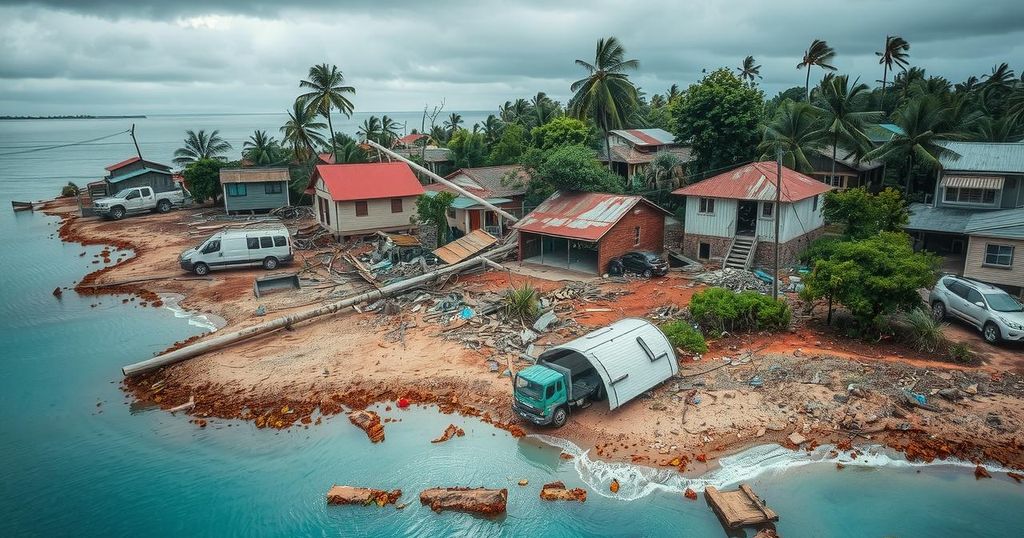World news
AFRICA, CABO DELGADO, CHI, CHIDO, EMERGENCY RESPONSE, EUROPEAN UNION, HURRICANE BERYL, LUISA MEQUE, MAPUTO, ME, MEQUE, MOZAMBICAN, MOZAMBIQUE, NAMPULA, NATIONAL INSTITUTE FOR DISASTER RISK MANAGEMENT AND REDUCTION, NATIONAL INSTITUTE OF RISK AND DISASTER MANAGEMENT, NATURAL DISASTER, NATURAL DISASTERS, NIASSA, RFI, TETE
Fatima Khan
0 Comments
Cyclone Chido Causes Catastrophic Damage in Mozambique, Leaving 34 Dead
Cyclone Chido has devastated Mozambique, causing at least 34 deaths, displacing thousands, and damaging critical infrastructure. The storm primarily affected Cabo Delgado, Nampula, and Niassa provinces, prompting humanitarian appeals amid ongoing risks from heavy rain and wind.
Cyclone Chido has wrought unimaginable devastation across Mozambique, with the National Institute of Risk and Disaster Management reporting a toll of at least 34 fatalities. The cyclone made landfall earlier this week, primarily affecting the provinces of Cabo Delgado, Nampula, and Niassa. Thousands of individuals have been displaced, and significant damage has occurred to infrastructure, including homes and transport routes, further exacerbating the situation in a region already prone to natural disasters and socio-economic challenges.
The impact of the cyclone was first noted in the Nampula province, where fatalities began to be reported. Luisa Meque, President of the National Institute for Disaster Risk Management and Reduction, emphasized the necessity for ongoing awareness and vigilance in the face of this natural disaster. Although the cyclone’s intensity has diminished, authorities continue to caution against the risks posed by lingering heavy rains and strong winds.
According to recent reports, the cyclone caused severe structural damage, destroying nearly 23,600 homes and damaging 170 fishing vessels. Additionally, approximately 175,000 individuals have been impacted by the storm, with 319 reported injuries. The cyclonic winds reached speeds of 260 kilometers per hour, and rainfall accumulation exceeded 250 millimeters within 24 hours. As a result, UNICEF and other humanitarian organizations have raised alarms over the adverse effects on vulnerable populations, especially children, who now face threats such as potential displacement and lack of basic necessities including water, medical care, and education.
Furthermore, Cyclone Chido, having transitioned into a severe storm, is expected to traverse Malawi and dissipate near Zimbabwe, which is also under alert for excessive rains fueled by the cyclone’s remnants. The humanitarian response is crucial as the region grapples with the aftermath of this natural calamity.
The recent occurrences of Cyclone Chido highlight the ongoing vulnerability of Mozambique to severe weather events. The impact of cyclones in this region is compounded by existing socio-economic instability and underdevelopment, with recurrence of such disasters threatening both infrastructure and communities alike. Cyclone Chido’s destructive path has underscored the importance of disaster preparedness, prompt humanitarian responses, and long-term strategies aimed at enhancing community resilience in the face of climate-induced threats.
In summary, Cyclone Chido has led to significant loss of life and extensive destruction in Mozambique, with the current report listing at least 34 fatalities and thousands displaced. The cyclone’s path has raised considerable concerns for affected communities, particularly vulnerable populations like children. As the storm moves onward, the enduring need for humanitarian assistance and disaster preparedness becomes increasingly pertinent for the region.
Original Source: www.rfi.fr




Post Comment